|
|
|
Sort Order |
|
|
|
Items / Page
|
|
|
|
|
|
|
| Srl | Item |
| 1 |
ID:
155750


|
|
|
|
|
| Summary/Abstract |
Analysis of Sri Lanka’s foreign policy over three decades (1977–2015) reveals a pattern of shifts from balancing to bandwagoning, and then back again to balancing. The more salient foreign policy issues during each administration fall broadly within the economic or security spheres. What are the key drivers of small state foreign policy – do systemic factors preside in general, and domestic factors prove inconsequential? Or are domestic factors able to play a decisive role under certain circumstances, within broader structural parameters? Three primary arguments are made in this regard. First, an interplay of system- and domestic-level factors best explains this pattern of foreign policy change. Second, in the domain of foreign economic policymaking, domestic imperatives and actors appear to play a decisive role, although within the broader structural preconditions. Third, systemic factors maintain predominance over domestic-level factors in shaping foreign security policy.
|
|
|
|
|
|
|
|
|
|
|
|
|
|
|
|
| 2 |
ID:
143637
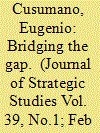

|
|
|
|
|
| Summary/Abstract |
The increasing use of private military and security companies (PMSCs) has attracted considerable scholarly attention due to its corrosive effects on US democracy. Drawing on neoclassical realism, this article provides a comparative dimension to the study of the political drivers of military privatisation by analysing contractor support to US and UK operations in Iraq and Afghanistan. Domestic political constraints have shaped both US and UK response to the need for more boots on the ground, increasing the propensity to use contractors as a force multiplier in spite of their problematic impact on military effectiveness.
|
|
|
|
|
|
|
|
|
|
|
|
|
|
|
|
| 3 |
ID:
124412
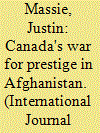

|
|
|
|
|
| Publication |
2013.
|
| Summary/Abstract |
This article provides a comprehensive assessment of Canada's prolonged and sizable military engagement in the war in Afghanistan in light of confounding expectations set by realism. It argues, from the perspective of neoclassical realism, that United States unipolarity, domestic elite consensus on an Atlanticist security policy, and executive autonomy vis-à-vis public dissent best account for Canada's evolving Afghanistan policy. These necessary conditions can be generalized to apply to past and future allied coalitions of the willing to help make sense of Canada's alliance burden-sharing.
|
|
|
|
|
|
|
|
|
|
|
|
|
|
|
|
| 4 |
ID:
160717
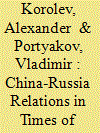

|
|
|
|
|
| Summary/Abstract |
Although not formal allies, China and Russia have steadily increased their strategic cooperation. However, crises and tensions in each other's areas of strategic interest continue to complicate each country's relations with the other and the rest of the international community. In this article we explore China's reaction toward major crises in the post-Soviet space (the Caucasus crisis of 2008 and the Ukraine crisis of 2014) and Russia's responses to the South China Sea dispute and show that they share many similarities. To explain the reaction patterns and better understand the nature of contemporary China-Russia relations, we apply a neoclassical realist framework, which helps assess the impact of both system-level and unit-level factors on great powers' behavior. The assessment demonstrates that the observed behavior pattern is an outcome of causal forces of different levels simultaneously pushing in different directions.
|
|
|
|
|
|
|
|
|
|
|
|
|
|
|
|
| 5 |
ID:
184349
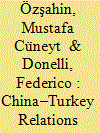

|
|
|
|
|
| Summary/Abstract |
There is plenty of studies focusing on China’s global outreach through its Belt and Road Initiative (BRI). In tandem with this, the extensive literature on China depicts it as the next hegemon to succeed in the USA. Along this line, flourishing ties with various Asian nations, including the Middle Eastern countries, as a result of China’s recent foreign policy activism has been addressed extensively. While most research has been stressing the rising assertiveness of China in world politics, only a limited number of studies have touched upon the responses from middle or small powers against China’s ascent. Drawing from neoclassical realism, this article contends two levels of analysis for delineating the interaction between Turkey, a middle power, and China, a rising great power. First, the exchange between Turkey and the USA is vital in determining the cordial relations between Turkey and China. Alteration in the American policy vis-à-vis Turkey in the wake of the Arab Spring is relevant to Turkey’s growing relations with China. Second, is the rising anti-Westernism of foreign policy elites as part of the alteration in the strategic culture of Turkish politics, which makes Turkey’s rapprochement with China possible. Nevertheless, it should be noted that these two levels are intertwined and feed each other. Consequently, employing a neoclassical realist approach, the article argues that the middle powers’ stance against a rising hegemon is conditional upon the bilateral relations with the current hegemon and peculiarities of domestic politics.
|
|
|
|
|
|
|
|
|
|
|
|
|
|
|
|
| 6 |
ID:
113185


|
|
|
|
|
| Publication |
2012.
|
| Summary/Abstract |
Since the 1990s, Japan and the Republic of Korea have chosen dissimilar policy options with respect to the US-led missile defense (MD) systems in East Asia. What explains the two countries' dissimilar MD strategies? Inspired by neoclassical realism, this study introduces a framework of domestic hurdles that combines Randall Schweller's cohesion model and Jeffry Taliaferro's resource extraction model. It sheds light on the degree of elite cohesion and social and economic impediments as key causal determinants that impede balancing against external threats. Although the influence of systemic variables that suppose optimal policy options, such as balancing, domestic hurdles impede or delay such options. This study will provide useful contributions to international relations by offering comparative and theoretical analyses on different paths that Tokyo and Seoul have chosen for their MD policies.
|
|
|
|
|
|
|
|
|
|
|
|
|
|
|
|
| 7 |
ID:
124078
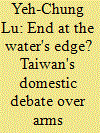

|
|
|
|
|
| Publication |
2013.
|
| Summary/Abstract |
Taiwan's purchase of weaponry from the United States has been an intriguing question to scholars and practitioners in Taiwan as well as the United States. To date, despite the growing threat put forth by mainland China's military strength, the question of why Taiwan is somehow short of actions as revealed in its delay in defense procurement is still under contestation. This paper employs the neoclassical realist approach to explain why there seems to be a gap in practice between the U.S. "goodwill" to sell and Taiwan's seemingly delayed response under the Chen administration. In addition, the author further investigates Taiwan's considerations under the Ma administration. The author argues that this gap can be attributed to the thinking of political elites in Taiwan, such as their perceptions of China's resolve and capabilities to unify Taiwan and of U.S. determination to protect Taiwan, their political considerations that aim to prevent the rivals from gaining domestic and international support, and their views about the most cost-effective ways to allocate national financial resources. With the review of relevant debates in Taiwan between 2000 and 2012, the preliminary findings of this paper indicate that political elites have become more pragmatic in terms of perceptions of mainland China and of the U.S., and yet partisanship and resource allocation seem to dominate, if not determine, their views on U.S. arms sales to Taiwan.
|
|
|
|
|
|
|
|
|
|
|
|
|
|
|
|
| 8 |
ID:
187480
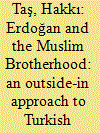

|
|
|
|
|
| Summary/Abstract |
Amidst multiple foreign policy flip-flops of the Turkish government, the Middle East is where observers agree most about the explanatory priority of ideational factors over realpolitik calculations. The assertive foreign policy activism to extend the country’s role in the region has largely been linked to the Islamist leanings of the ruling Justice and Development Party (AKP). This study revisits Turkey’s Middle East policy with a particular focus on the AKP’s relations with the Muslim Brotherhood (Ikhwan al Muslimin), which marked Turkish foreign policy formulation and implementation in multiple theatres from Yemen to Egypt to Libya. Using a neoclassical realist approach, it argues that the AKP’s ideological ties to the Ikhwan are significant for the availability of new resources but Turkish foreign policy behavior in the Middle East, including relations with the Ikhwan, reflects a grand strategy to respond to systemic and sub-systemic stimuli.
|
|
|
|
|
|
|
|
|
|
|
|
|
|
|
|
| 9 |
ID:
144077
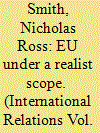

|
|
|
|
|
| Summary/Abstract |
This article breaks from the dominant liberal-idealist literature and examines the European Union’s (EU) foreign policy decisions from a realist perspective. Through employing a novel, EU-focussed neoclassical realist framework, the EU’s offer of a Deep and Comprehensive Free Trade Agreement (DCFTA) to Ukraine is argued as being a result of the mediating influence of its normative power role identity, the (mis)perceptions held by its foreign policy decision-makers and the institutional constraints inherent to its foreign policy decision-making process, which filtered systemic pressures (emanating from the European geopolitical setting) into the final foreign policy decision. Thereafter, this article assesses the EU’s responses to the Ukraine crisis, offering policy reflections and recommendations.
|
|
|
|
|
|
|
|
|
|
|
|
|
|
|
|
| 10 |
ID:
187481
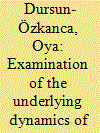

|
|
|
|
|
| Summary/Abstract |
This article analyzes contemporary Turkey-European Union (EU) relations through the lenses of international relations (IR) theory. After providing a brief overview of the history of Turkey-EU relations, it focuses on the underlying dynamics of Turkey-EU relations in the post-2016 period. It makes a case that realism is better suited to explain the latest episodes in Turkey-EU relations. It specifically argues that balancing and neoclassical realism provide a more nuanced explanatory value as to why Turkey and the EU are going through a particularly tense period in their relationship. It also outlines global/regional factors as well as intervening national/domestic factors behind the rising tensions in Turkey’s relations with the EU.
|
|
|
|
|
|
|
|
|
|
|
|
|
|
|
|
| 11 |
ID:
159423


|
|
|
|
|
| Summary/Abstract |
Why has Japan attempted to promote Asian security multilateralism for over two decades despite its open acknowledgment of the vital centrality of the US–Japan alliance in its overall foreign and security policy? Why has Japan's pursuit of regional security multilateralism sometimes swayed between an inclusive ‘Asia-Pacific’ (with the US) and an exclusive ‘East Asian’ format (without the US)? This article examines the nature of Japan's approach to Asian security multilateralism through a new analytical model based on the decentering/recentering framework and major theoretical assumptions deriving from neoclassical realism. It unpacks the process by which Japanese policy-makers have come to recognize Asian security multilateralism as a means of advancing perceived political and security interests, arising from international pressures and opportunities. The analysis is divided into three phases; (1) Japan's leading role in the formation of the ASEAN Regional Forum (1991–1994), (2) Japan's initiatives for the establishment of the ASEAN Plus Three and the East Asian Summit (1997–2005), and (3) Japan's renewed focus on the EAS with US membership (2010-onwards). The article reveals the changing dynamics of the ideas and motivations behind Japan's initiatives for Asian security multilateralism.
|
|
|
|
|
|
|
|
|
|
|
|
|
|
|
|
| 12 |
ID:
142978
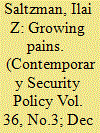

|
|
|
|
|
| Summary/Abstract |
The rise of China has attracted considerable scholarly attention since the early 1990s. Recent developments in Japan leave no doubt, however, that close attention to Tokyo's changing foreign and security policy also is in order. In a break with tradition, the government of Prime Minister Shinzō Abe's approved in 2014 a new interpretation of Article 9 of the Japanese Constitution, facilitating the shift from basic self-defence to collective self-defence that allows Japan to assume greater regional and global security assertiveness and responsibility. This article examines the trajectory of Japan's security policy transformation, focusing on the causes and nature of this dramatic reorientation. By applying a neoclassical realist framework, the article traces the intricate interplay between shifts in Japan's strategic environment, domestic politics and the security policy decision-making process. Abe and the hawkism he represents will undoubtedly face Herculean hurdles in the future. Still, continued external challenges will inevitably force Tokyo to ‘normalize’ its security policy and shed off the remaining relics of its pacifism and anti-militarism. The article also concludes that the significant inducements driving Japanese security normalization are challenged by powerful domestic opposition. While the process will remain piecemeal rather than revolutionary, the course of Japan's security policy favours continued self-assertion, emancipation and reform.
|
|
|
|
|
|
|
|
|
|
|
|
|
|
|
|
| 13 |
ID:
172423


|
|
|
|
|
| Summary/Abstract |
Ideational variables have frequently been employed in positivist-minded and materialist analyses of state behaviour. Almost inevitably, because of these commitments, such studies run into theoretical challenges relating to the use of ideas. In this article, I suggest that integrating ideational factors in positivist and materialist approaches to state behaviour requires: (1) distinguishing conceptually between interests and ideation as well as between individual beliefs and social ideas; and (2) addressing challenges of operationalisation and measurability. To that end, I employ neoclassical realism as a case study. I argue that a re-conceptualisation of ideas as externalised individual beliefs employed in political deliberation allows neoclassical realists to focus on how ideas and ideational competition intervene in the transmission belt from materially given interests to foreign policy choice. At the same time, it more clearly operationalises ideas as identifiable in language and communication. I suggest this reconceptualisation, while consistent with realist paradigmatic assumptions, need not be limited to neoclassical realism. Instead, transposed to different paradigms, it would similarly allow positivist-minded constructivists and institutionalists to avoid a conceptually and methodologically awkward equation of different ideational factors.
|
|
|
|
|
|
|
|
|
|
|
|
|
|
|
|
| 14 |
ID:
123026
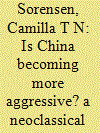

|
|
|
|
|
| Publication |
2013.
|
| Summary/Abstract |
In this article I seek to improve the dominant neorealist analysis of China's rise. I offer a neoclassical realist analytical framework in order to identify the influence of certain Chinese domestic developments and priorities on Chinese foreign and security policy behavior. Rather than reflecting a more self-confident and aggressive China, developments in Chinese foreign and security policy in recent years reveal an internally conflicted, inward-looking, and reactive China not yet ready for its new international role. Beijing is uncertain how to manage the challenges and the inevitable tension, both domestically and internationally, arising from China's rapid development.
|
|
|
|
|
|
|
|
|
|
|
|
|
|
|
|
| 15 |
ID:
160060
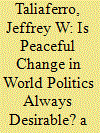

|
|
|
|
|
| Summary/Abstract |
An assumption runs through this symposium that peaceful change is desirable and ought to be encouraged. We do not believe it is that simple. The term “peaceful change” itself is not well defined. The article, therefore, narrowly defines peaceful change as a process whereby a hegemon voluntarily cedes its dominant geopolitical role to a challenger in one or more regions. Drawing on neoclassical realism, we hypothesize that a declining hegemon will only accept peaceful change if: (1) it has high confidence change is inevitable because it lacks the military, economic, or political means to resist it; or (2) when domestic political or economic costs of resistance of prohibitively high; or (3) when the leadership of the hegemonic state faces domestic constraints in its ability to enact policies to resist the challenger.
|
|
|
|
|
|
|
|
|
|
|
|
|
|
|
|
| 16 |
ID:
160014
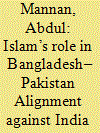

|
|
|
|
|
| Summary/Abstract |
This article engages with Bangladesh’s policy of seeking alignment with Pakistan, pursued by the Bangladesh Nationalist Party (BNP) government in different tenures from the 1990s on. In this endeavour, the article takes into account the BNP’s politics of Islamic identity as a key variable of analysis. This identity factor tacitly presents Bangladesh, Pakistan and India as ‘Muslim Bangladesh’, ‘Muslim Pakistan’, and ‘Hindu India’, respectively. It frames ‘Muslim Pakistan’ as a mutual ally of ‘Muslim Bangladesh’ and shares with Pakistan a view of ‘Hindu India’ as the enemy-other. It operates in foreign policy through domestic politics in Bangladesh, wherein for the BNP, being anti-Indian is synonymous with being pro-Islam. It is claimed in this article that this politics of Islamic identity draws Bangladesh into an alignment with Pakistan, dragging Bangladesh into Pakistan’s own conflict with India.
|
|
|
|
|
|
|
|
|
|
|
|
|
|
|
|
| 17 |
ID:
168514
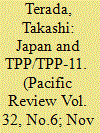

|
|
|
|
|
| Summary/Abstract |
Based on the neoclassical realism approach, this article aims to clarify factors conducive to Japan’s different roles in both participating in the trans-pacific partnership (TPP) and concluding the TPP-11 by focusing on how the US’s distinctive attitudes towards the TPP under the Obama and Trump administrations influenced Japan’s changing approaches. During the Obama administration, which needed Japan’s participation to expand the TPP in the face of China’s growing global and regional economic influence, Japan incorporated the TPP into its growth strategy and committed itself to sustaining US leadership during TPP negotiations by making necessary concessions on both the international and domestic fronts. By contrast, the Trump administration, with its strong propensity for bilateral deals to counter China’s bid for global economic hegemony with the TPP withdrawal urged Japan to change its reactive stance and take a proactive role in TPP-11 negotiations. This article opens a ‘black box’ of the political system under the second administration of Shinzo Abe, and demonstrates the strengthened function of the Prime Minister’s Office and Cabinet Secretariat or Kantei within the centralised trade policy-making apparatus as key mechanisms contributing to a departure from the traditional features that occasionally hampered Japan’s foreign economic policy initiatives.
|
|
|
|
|
|
|
|
|
|
|
|
|
|
|
|
| 18 |
ID:
113616
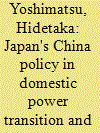

|
|
|
|
|
| Publication |
2012.
|
| Summary/Abstract |
The main objectives of this article are to examine the evolution of Japan's China policy in a power shift to the Democratic Party of Japan (DPJ) and to provide theoretical explanations for the evolution. The DPJ government showed accommodating postures toward China, and such postures derived from the DPJ leaders' particular preferences and perceptions as well as the party's aspiration for legitimating its power formation against the previous government. At the same time, political and security linkages with Washington constituted the baseline for Japan's evolving diplomatic intercourses with China. Neoclassical realism, which integrates domestic political factors with systemic political configurations, can provide valuable insights for explaining major aspects in the evolution of Japan's China policy.
|
|
|
|
|
|
|
|
|
|
|
|
|
|
|
|
| 19 |
ID:
131362


|
|
|
|
|
| Publication |
2014.
|
| Summary/Abstract |
In March 2011, President Barack Obama ordered US air and naval forces to commence Operation Odyssey Dawn in Libya to impose a no-fly zone. The decision by the Obama Administration to intervene in a limited and supporting role in Libya is an important development in US foreign policy. Operation Odyssey Dawn presents scholars with a valuable opportunity to analyze and explore how US foreign policy is made and what roles domestic politics and elite perceptions play in decisions to use force. The author argues that neoclassical realism is a useful and compelling theoretic framework with which to analyze Operation Odyssey Dawn. While the Administration intervened in response to perceived external-level threats to US national interests, salient intervening domestic-level variables and elite perceptions shaped and guided the tenor and scope of the operation.
|
|
|
|
|
|
|
|
|
|
|
|
|
|
|
|
| 20 |
ID:
105389


|
|
|
|
|
| Publication |
2011.
|
| Summary/Abstract |
A panoramic outlook on the present global system shows that the US has been failing to preserve its global preponderance against the rise of new contenders from Asia. Turkey's new foreign policy demeanor under the AKP government reflects this shift of global power from the West to the East, leaning on both of these two poles (especially Russia and the US), thereby, aims at creating a 'zero-problem' situation with the neighboring Caucasian states. Yet, this strategy has not achieved its goal, mainly due to the ongoing debates, not only between Moscow and Washington, but also between Azerbaijan and Armenia in the Caucasian Regional Security Complexity. This work tries to read all these developments by applying insights from the neoclassical realist standing and argues that there are two main hindrances to the plan's success: the dynamics of the current global system and the security complexity of the Caucasus region.
|
|
|
|
|
|
|
|
|
|
|
|
|
|
|
|
|
|
|
|
|